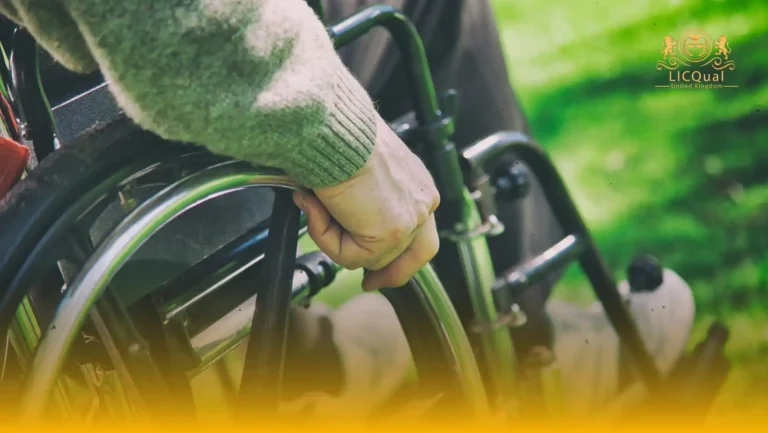The LICQual Level 3 Certificate in Healthcare Law and Ethics is a specialized qualification designed for professionals working within healthcare, social care, and related sectors who wish to advance their knowledge and strengthen their professional practice. This qualification is not intended for fresh candidates; it is specifically aimed at experienced learners who want to enhance their career prospects, deepen their understanding of healthcare legislation and ethical frameworks, and contribute to their Continuing Professional Development (CPD).
The course provides learners with the essential skills to navigate complex legal and ethical challenges within healthcare environments. Topics covered include healthcare regulations, patient rights, ethical decision-making, and professional responsibilities, ensuring learners are equipped to uphold high standards of care and compliance in their roles.
Centres delivering this qualification must ensure that teaching is supported by competent and qualified staff with relevant industry expertise. Additionally, centres are required to provide learners with access to comprehensive learning resources, modern facilities, and effective support systems to guarantee high-quality training and learner achievement.
By completing this programme, learners will gain a strong foundation in healthcare law and ethics, enabling them to apply theoretical knowledge to practical scenarios in clinical and community-based settings. This qualification also provides opportunities for professional growth, preparing learners for greater responsibility, leadership, and career progression within the healthcare and social care sectors.
Course Overview
Qualification Title
LICQual Level 3 Certificate in Healthcare Law and Ethics
Total Units
6
Total Credits
24
GLH
120
Qualification #
LICQ2200725
Qualification Specification
To enroll in the LICQual Level 3 Certificate in Gerontology and Geriatric Care Management, applicants must meet the following criteria:
|
Qualification# |
Unit Title |
Credits |
GLH |
|---|---|---|---|
|
LICQ2200725-1 |
Introduction to Healthcare Law and Ethical Principles |
4 |
20 |
|
LICQ2200725-2 |
Patient Rights, Consent, and Confidentiality |
4 |
20 |
|
LICQ2200725-3 |
Legal and Ethical Issues in Clinical Practice |
4 |
20 |
|
LICQ2200725-4 |
Safeguarding, Equality, and Human Rights in Healthcare |
4 |
20 |
|
LICQ2200725-5 |
Ethical Decision-Making and Professional Conduct |
4 |
20 |
|
LICQ2200725-6 |
Contemporary Challenges in Healthcare Law and Ethics |
4 |
20 |
Unit 1: Introduction to Healthcare Law and Ethical Principles
By the end of this unit, learners will be able to:
- Explain the role of healthcare law and ethical principles in professional practice.
- Analyse the principles of autonomy, beneficence, non-maleficence, and justice.
- Evaluate how legal and ethical frameworks guide decision-making in healthcare.
Unit 2: Patient Rights, Consent, and Confidentiality
By the end of this unit, learners will be able to:
- Demonstrate understanding of informed consent and its legal implications.
- Apply principles of confidentiality and data protection in healthcare settings.
- Assess the balance between patient rights and professional responsibilities.
Unit 3: Legal and Ethical Issues in Clinical Practice
By the end of this unit, learners will be able to:
- Identify and evaluate cases of negligence, malpractice, and liability in healthcare.
- Apply ethical reasoning to complex scenarios such as end-of-life care.
- Analyse case studies to understand the impact of legal and ethical decisions on patient outcomes.
Unit 4: Safeguarding, Equality, and Human Rights in Healthcare
By the end of this unit, learners will be able to:
- Explain the legal responsibilities of safeguarding vulnerable adults and children.
- Evaluate the importance of equality, diversity, and inclusion in healthcare law.
- Apply human rights legislation to promote fairness and dignity in healthcare practice.
Unit 5: Ethical Decision-Making and Professional Conduct
By the end of this unit, learners will be able to:
- Apply ethical decision-making models to practical healthcare situations.
- Uphold professional codes of conduct and regulatory standards in practice.
- Demonstrate how to balance organisational policies with patient-centred care.
Unit 6: Contemporary Challenges in Healthcare Law and Ethics
By the end of this unit, learners will be able to:
- Analyse emerging challenges such as digital health, AI, and medical data ethics.
- Evaluate ethical and legal implications of public health emergencies and pandemics.
- Prepare for advanced responsibilities by applying ethical and legal knowledge to future healthcare challenges.
The LICQual Level 3 Certificate in Healthcare Law and Ethics is designed for professionals who want to strengthen their knowledge of legal and ethical practices in healthcare. Whether you work in hospitals, clinics, social care, or administration, this course equips you with the skills to make informed, responsible decisions and enhance your professional credibility.
1. Healthcare Professionals Seeking Legal and Ethical Knowledge
- Gain in-depth understanding of medical law and healthcare regulations
- Learn to protect patient rights and maintain confidentiality
- Develop skills to handle ethical dilemmas in clinical settings
- Understand professional accountability and responsibilities
- Apply best practices in healthcare legal compliance
- Enhance career opportunities in hospitals and healthcare organizations
2. Social Care Workers and Support Staff
- Learn ethical practices for patient and client care
- Understand the legal responsibilities in social care services
- Develop communication skills for sensitive situations
- Gain confidence in decision-making for vulnerable adults
- Apply ethical frameworks in daily caregiving routines
- Stay compliant with healthcare policies and regulations
3. Aspiring Healthcare Administrators and Managers
- Learn to implement legal and ethical policies in healthcare organizations
- Gain skills in managing staff while ensuring compliance
- Understand healthcare governance and regulatory requirements
- Improve operational efficiency with ethical decision-making
- Lead teams in accordance with healthcare law standards
- Build credibility as a professional in healthcare management
4. Students and Graduates Exploring Healthcare Careers
- Acquire practical knowledge in healthcare law and ethics
- Build a recognized Level 3 certification for your CV
- Explore careers in hospitals, clinics, and community healthcare
- Gain confidence in handling legal and ethical issues professionally
- Understand patient rights and ethical healthcare standards
- Stand out in competitive healthcare or social care programs
5. Family Caregivers and Informal Care Providers
- Understand legal responsibilities when caring for family members
- Learn safe and ethical caregiving practices
- Protect patient privacy and rights at home
- Make informed decisions in medical and healthcare scenarios
- Gain practical skills in supporting older adults and vulnerable patients
- Enhance confidence in providing responsible, compliant care
6. Professionals Preparing for Healthcare Certification Exams
- Build knowledge aligned with legal and ethical standards in healthcare
- Gain confidence for professional licensing or certification exams
- Learn practical applications of healthcare law and ethics
- Understand risk assessment, patient safety, and compliance
- Improve career prospects in healthcare and social care roles
- Apply ethical and legal principles in real-world situations
7. Community Workers and Volunteers in Healthcare Programs
- Support community healthcare initiatives effectively
- Understand healthcare law and ethics for community programs
- Provide ethical guidance and support to patients and families
- Develop skills to address legal and moral challenges in the field
- Gain practical knowledge for safe and responsible community care
- Enhance impact and effectiveness as a volunteer in healthcare services
Centres delivering the LICQual Level 3 Certificate in Healthcare Law and Ethics must meet defined standards to ensure that learners receive high-quality training, effective support, and access to the resources needed for successful completion. Strong infrastructure, qualified staff, and robust quality assurance processes are essential for delivery.
Key requirements include:
- Qualified and Competent Staff
- Tutors, trainers, and assessors must hold relevant academic qualifications and professional experience in healthcare, law, or ethics.
- Staff must be skilled in delivering Level 3 programmes and capable of supporting learners in applying theory to practice.
- Learning and Teaching Resources
- Centres must provide up-to-date textbooks, journals, online resources, and case studies covering healthcare law, ethics, and professional practice.
- Access to digital learning platforms, reference materials, and examples of real-world applications is essential for learner success.
- Facilities and Infrastructure
- A suitable learning environment including classrooms, IT facilities, and where appropriate, access to online or blended learning tools.
- Resources must support both face-to-face and virtual delivery to accommodate diverse learner needs.
- Assessment and Internal Quality Assurance
- Clear procedures for assessment, moderation, and learner feedback.
- Strong quality assurance systems to ensure consistency, fairness, and reliability in assessment outcomes.
- Learner Support Services
- Ongoing academic and pastoral support to enable learners to achieve their full potential.
- Guidance on career development and Continuing Professional Development (CPD) opportunities within healthcare law and ethics.
By meeting these requirements, centres will ensure that the qualification is delivered to the highest standards, enabling learners to gain the legal knowledge, ethical understanding, and professional competencies required for advancement in healthcare and social care environments.
Assessment and Verification
All units within this qualification are subject to internal assessment by the approved centre and external verification by LICQual. The qualification follows a criterion-referenced assessment approach, ensuring that learners meet all specified learning outcomes.
To achieve a ‘Pass’ in any unit, learners must provide valid, sufficient, and authentic evidence demonstrating their attainment of all learning outcomes and compliance with the prescribed assessment criteria. The Assessor is responsible for evaluating the evidence and determining whether the learner has successfully met the required standards.
Assessors must maintain a clear and comprehensive audit trail, documenting the basis for their assessment decisions to ensure transparency, consistency, and compliance with quality assurance requirements.







